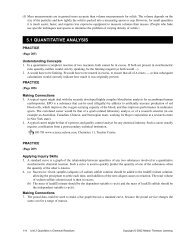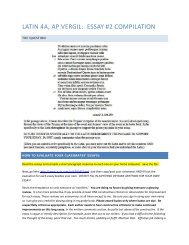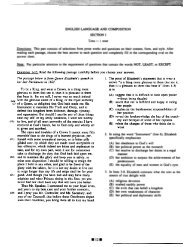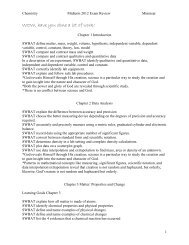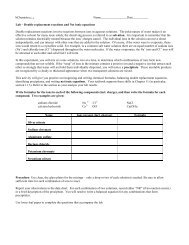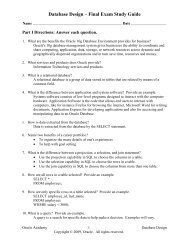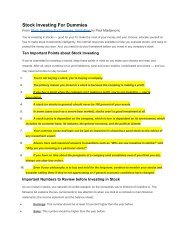Business and Personal Finance Unit 2 Chapter 6 © 2007 ... - Quia
Business and Personal Finance Unit 2 Chapter 6 © 2007 ... - Quia
Business and Personal Finance Unit 2 Chapter 6 © 2007 ... - Quia
You also want an ePaper? Increase the reach of your titles
YUMPU automatically turns print PDFs into web optimized ePapers that Google loves.
<strong>Business</strong> <strong>and</strong> <strong>Personal</strong> <strong>Finance</strong> <strong>Unit</strong> 2 <strong>Chapter</strong> 6 © <strong>2007</strong> Glencoe/McGraw-Hill<br />
0
<strong>Chapter</strong> 6<br />
Consumer Credit<br />
What You’ll Learn<br />
• Section 6.1<br />
• Explain the meaning of consumer credit.<br />
• Differentiate between closed-end credit <strong>and</strong> openend<br />
credit.<br />
• Section 6.2<br />
• Name the five C’s of credit.<br />
• Identify factors to consider when choosing a loan or<br />
credit card.<br />
• Explain how to build <strong>and</strong> protect your credit rating.<br />
• Section 6.3<br />
• Discuss how to protect yourself from fraud <strong>and</strong><br />
identity theft.<br />
• Section 6.4<br />
• Identify ways to manage debt problems.<br />
<strong>Business</strong> <strong>and</strong> <strong>Personal</strong> <strong>Finance</strong> <strong>Unit</strong> 2 <strong>Chapter</strong> 6 © <strong>2007</strong> Glencoe/McGraw-Hill<br />
1
Credit Payments<br />
• Q: My brother is going to college <strong>and</strong> has three credit cards<br />
with balances totaling $5,000. He is having trouble paying<br />
the minimum monthly payments. What should I tell him?<br />
• A: He needs a plan to pay down these debts. Have him<br />
contact the credit card companies <strong>and</strong> tell them that he<br />
wants to pay the debt <strong>and</strong> maintain good credit. They may<br />
accept payments of interest only for a few months while he<br />
finds ways to increase his income or cut spending.<br />
Go to finance07.glencoe.com to complete the St<strong>and</strong>ard &<br />
Poor’s Financial Focus activity.<br />
<strong>Business</strong> <strong>and</strong> <strong>Personal</strong> <strong>Finance</strong> <strong>Unit</strong> 2 <strong>Chapter</strong> 6 © <strong>2007</strong> Glencoe/McGraw-Hill<br />
2
Section 6.1<br />
What Is Consumer Credit?<br />
What is your<br />
definition of<br />
credit?<br />
Main Idea<br />
There are advantages to using consumer credit<br />
if you use it correctly.<br />
<strong>Business</strong> <strong>and</strong> <strong>Personal</strong> <strong>Finance</strong> <strong>Unit</strong> 2 <strong>Chapter</strong> 6 © <strong>2007</strong> Glencoe/McGraw-Hill<br />
3
Section 6.1<br />
What Is Consumer Credit?<br />
credit<br />
an arrangement to<br />
receive cash,<br />
goods, or services<br />
now <strong>and</strong> pay for<br />
them in the future<br />
creditor<br />
an entity that<br />
lends money<br />
consumer credit<br />
the use of credit<br />
for personal<br />
needs<br />
Using Consumer Credit Wisely<br />
When you borrow money or charge an item to a<br />
credit card, you are using credit. A creditor can<br />
be:<br />
• A financial institution<br />
• A merchant<br />
• An individual<br />
Consumer credit is a major force in the<br />
American economy, <strong>and</strong> the use of credit is a<br />
basic factor in personal <strong>and</strong> family financial<br />
planning.<br />
<strong>Business</strong> <strong>and</strong> <strong>Personal</strong> <strong>Finance</strong> <strong>Unit</strong> 2 <strong>Chapter</strong> 6 © <strong>2007</strong> Glencoe/McGraw-Hill<br />
4
Section 6.1<br />
What Is Consumer Credit?<br />
Credit Uses <strong>and</strong> Misuses<br />
Using credit may increase the amount of money<br />
you can spend now, but the cost of credit<br />
decreases the amount of money you will have in<br />
the future.<br />
That is because you will be paying back:<br />
• The money you borrowed<br />
• Any charges for borrowing that money<br />
<strong>Business</strong> <strong>and</strong> <strong>Personal</strong> <strong>Finance</strong> <strong>Unit</strong> 2 <strong>Chapter</strong> 6 © <strong>2007</strong> Glencoe/McGraw-Hill<br />
5
Section 6.1<br />
What Is Consumer Credit?<br />
Factors to Consider Before Using<br />
Credit<br />
Before you decide to finance a major purchase<br />
by using credit, consider:<br />
• Do you have the cash you need for the<br />
down payment?<br />
• Can you afford the item?<br />
• Could you put off buying the item for a<br />
while?<br />
• What are the costs of using credit?<br />
Make sure the benefits of making the purchase<br />
now outweigh the costs of credit.<br />
<strong>Business</strong> <strong>and</strong> <strong>Personal</strong> <strong>Finance</strong> <strong>Unit</strong> 2 <strong>Chapter</strong> 6 © <strong>2007</strong> Glencoe/McGraw-Hill<br />
6
Section 6.1<br />
What Is Consumer Credit?<br />
Advantages of Credit<br />
Using consumer credit allows you to:<br />
• Enjoy goods <strong>and</strong> services now <strong>and</strong> pay<br />
for them later.<br />
• Combine several purchases, making just<br />
one monthly payment.<br />
• Keep a record of your expenses.<br />
• Shop <strong>and</strong> travel without carrying a lot of<br />
cash.<br />
If you use credit wisely, other lenders will view<br />
you as a responsible person.<br />
<strong>Business</strong> <strong>and</strong> <strong>Personal</strong> <strong>Finance</strong> <strong>Unit</strong> 2 <strong>Chapter</strong> 6 © <strong>2007</strong> Glencoe/McGraw-Hill<br />
7
THINK FIRST Everyone likes to have nice things, but using credit<br />
unwisely can lead to problems. What should you consider before<br />
using credit?<br />
<strong>Business</strong> <strong>and</strong> <strong>Personal</strong> <strong>Finance</strong> <strong>Unit</strong> 2 <strong>Chapter</strong> 6 © <strong>2007</strong> Glencoe/McGraw-Hill<br />
8
Section 6.1<br />
What Is Consumer Credit?<br />
Disadvantages of Credit<br />
Always remember that credit costs money. If<br />
you fail to repay a credit card balance:<br />
• You can lose your good credit reputation.<br />
• You may also lose some of your income<br />
<strong>and</strong> property, which may be taken from<br />
you in order to repay your debts.<br />
You should always approach credit with caution<br />
<strong>and</strong> avoid using it for more than your budget<br />
allows.<br />
<strong>Business</strong> <strong>and</strong> <strong>Personal</strong> <strong>Finance</strong> <strong>Unit</strong> 2 <strong>Chapter</strong> 6 © <strong>2007</strong> Glencoe/McGraw-Hill<br />
9
Section 6.1<br />
What Is Consumer Credit?<br />
Types of Credit<br />
There are two basic types of consumer credit:<br />
• Closed-end credit<br />
• Open-end credit<br />
You may use both types during your lifetime<br />
because each has advantages <strong>and</strong><br />
disadvantages.<br />
<strong>Business</strong> <strong>and</strong> <strong>Personal</strong> <strong>Finance</strong> <strong>Unit</strong> 2 <strong>Chapter</strong> 6 © <strong>2007</strong> Glencoe/McGraw-Hill<br />
10
Section 6.1<br />
What Is Consumer Credit?<br />
closed-end<br />
credit<br />
credit as a onetime<br />
loan that you<br />
will pay back over<br />
a specified period<br />
of time in<br />
payments of equal<br />
amounts.<br />
Closed-End Credit<br />
Closed-end credit is used for a specific purpose<br />
<strong>and</strong> involves a definite amount of money.<br />
Examples of closed-end credit include:<br />
• A mortgage<br />
• Vehicle loans<br />
• Installment loans for purchasing furniture<br />
or large appliances<br />
These types of loans usually carry lower interest<br />
rates than open-end credit carries.<br />
<strong>Business</strong> <strong>and</strong> <strong>Personal</strong> <strong>Finance</strong> <strong>Unit</strong> 2 <strong>Chapter</strong> 6 © <strong>2007</strong> Glencoe/McGraw-Hill<br />
11
Section 6.1<br />
What Is Consumer Credit?<br />
open-end credit<br />
credit as a loan<br />
with a certain limit<br />
on the amount of<br />
money you can<br />
borrow for a<br />
variety of goods<br />
<strong>and</strong> services<br />
line of credit<br />
the maximum<br />
amount of money<br />
a creditor will<br />
allow a credit user<br />
to borrow<br />
Open-End Credit<br />
Examples of open-end credit include:<br />
• Department store credit cards<br />
• Bank credit cards (Visa or MasterCard)<br />
You can use your credit card to make as many<br />
purchases as you wish, as long as you do not<br />
exceed your line of credit.<br />
<strong>Business</strong> <strong>and</strong> <strong>Personal</strong> <strong>Finance</strong> <strong>Unit</strong> 2 <strong>Chapter</strong> 6 © <strong>2007</strong> Glencoe/McGraw-Hill<br />
12
Section 6.1<br />
What Is Consumer Credit?<br />
Sources of Consumer Credit<br />
Many sources of consumer credit are available,<br />
including:<br />
• Commercial banks<br />
• Credit unions<br />
<strong>Business</strong> <strong>and</strong> <strong>Personal</strong> <strong>Finance</strong> <strong>Unit</strong> 2 <strong>Chapter</strong> 6 © <strong>2007</strong> Glencoe/McGraw-Hill<br />
13
Section 6.1<br />
What Is Consumer Credit?<br />
Loans<br />
A loan is borrowed money with an agreement to<br />
repay it with interest within a certain amount of<br />
time. Before going to your local bank to take out<br />
a loan, you might want to consider:<br />
• Inexpensive loans (family members)<br />
• Medium-priced loans (commercial banks,<br />
savings <strong>and</strong> loan associations, credit<br />
unions)<br />
• Expensive loans (finance companies,<br />
retail stores, banks)<br />
• Home equity loans<br />
<strong>Business</strong> <strong>and</strong> <strong>Personal</strong> <strong>Finance</strong> <strong>Unit</strong> 2 <strong>Chapter</strong> 6 © <strong>2007</strong> Glencoe/McGraw-Hill<br />
14
Section 6.1<br />
What Is Consumer Credit?<br />
grace period<br />
a time period<br />
during which no<br />
finance charges<br />
will be added to<br />
your account<br />
finance charge<br />
the total dollar<br />
amount you pay<br />
to use credit<br />
Credit Cards<br />
Most credit card companies offer a grace period.<br />
If you pay your balance before the due date<br />
stated on your monthly bill, you will not have to<br />
pay a finance charge.<br />
The cost of a credit card depends on:<br />
• The type of credit card you have<br />
• The terms set forth by the lender<br />
<strong>Business</strong> <strong>and</strong> <strong>Personal</strong> <strong>Finance</strong> <strong>Unit</strong> 2 <strong>Chapter</strong> 6 © <strong>2007</strong> Glencoe/McGraw-Hill<br />
15
Section 6.1<br />
What Is Consumer Credit?<br />
Types of Cards<br />
Debit cards allow you to electronically subtract<br />
money from your savings or checking account to<br />
pay for goods or services.<br />
Other types of cards include:<br />
• Smart cards<br />
• Travel <strong>and</strong> entertainment (T&E) cards<br />
(American Express)<br />
<strong>Business</strong> <strong>and</strong> <strong>Personal</strong> <strong>Finance</strong> <strong>Unit</strong> 2 <strong>Chapter</strong> 6 © <strong>2007</strong> Glencoe/McGraw-Hill<br />
16
Section 6.2<br />
The Costs <strong>and</strong> Methods of Obtaining Credit<br />
How would you<br />
qualify for a credit<br />
card or loan?<br />
Main Idea<br />
You should consider the costs of credit <strong>and</strong> your<br />
own credit st<strong>and</strong>ing when applying for credit.<br />
<strong>Business</strong> <strong>and</strong> <strong>Personal</strong> <strong>Finance</strong> <strong>Unit</strong> 2 <strong>Chapter</strong> 6 © <strong>2007</strong> Glencoe/McGraw-Hill<br />
17
Section 6.2<br />
The Costs <strong>and</strong> Methods of Obtaining Credit<br />
Can You Afford a Loan?<br />
Taking out a loan can be a substantial financial<br />
burden. Before you take out a loan, make sure<br />
that you can afford it:<br />
• Add up all your basic monthly expenses<br />
<strong>and</strong> then subtracting the total from your<br />
take-home pay.<br />
• Consider what you might have to give up<br />
to make the monthly loan payment.<br />
• Use the debt payments-to-income ratio<br />
formula to decide whether you can safely<br />
take on the responsibility of credit.<br />
<strong>Business</strong> <strong>and</strong> <strong>Personal</strong> <strong>Finance</strong> <strong>Unit</strong> 2 <strong>Chapter</strong> 6 © <strong>2007</strong> Glencoe/McGraw-Hill<br />
18
Section 6.2<br />
The Costs <strong>and</strong> Methods of Obtaining Credit<br />
net income<br />
the income you<br />
receive (takehome<br />
pay,<br />
allowance, gifts,<br />
<strong>and</strong> interest)<br />
Debt Payments-to-Income Ratio<br />
The debt payments-to-income ratio is the<br />
percentage of debt you have in relation to your<br />
net income. Experts suggest that you spend no<br />
more than 20 percent of your net income on<br />
debt payments, which include:<br />
• Credit card payments<br />
• Loan payments<br />
You can calculate your debt payments-toincome<br />
ratio by dividing your total monthly debt<br />
payments by your monthly net income.<br />
<strong>Business</strong> <strong>and</strong> <strong>Personal</strong> <strong>Finance</strong> <strong>Unit</strong> 2 <strong>Chapter</strong> 6 © <strong>2007</strong> Glencoe/McGraw-Hill<br />
19
Section 6.2<br />
The Costs <strong>and</strong> Methods of Obtaining Credit<br />
The Cost of Credit<br />
If you are thinking of taking out a loan or<br />
applying for a credit card, your first step should<br />
be to figure out:<br />
• How much the loan will cost you<br />
• Whether you can afford it<br />
Two key factors in your decision will be:<br />
• The finance charge<br />
• The annual percentage rate (APR)<br />
<strong>Business</strong> <strong>and</strong> <strong>Personal</strong> <strong>Finance</strong> <strong>Unit</strong> 2 <strong>Chapter</strong> 6 © <strong>2007</strong> Glencoe/McGraw-Hill<br />
20
Section 6.2<br />
The Costs <strong>and</strong> Methods of Obtaining Credit<br />
annual<br />
percentage rate<br />
(APR)<br />
the cost of credit<br />
on a yearly basis,<br />
expressed as a<br />
percentage<br />
The <strong>Finance</strong> Charge <strong>and</strong> the Annual<br />
Percentage Rate (APR)<br />
The finance charge, or total dollar amount you<br />
pay to use credit, is calculated using the annual<br />
percentage rate (APR).<br />
All organizations must state the true APR that<br />
they charge their customers. This makes it easy<br />
to compare the cost of credit.<br />
<strong>Business</strong> <strong>and</strong> <strong>Personal</strong> <strong>Finance</strong> <strong>Unit</strong> 2 <strong>Chapter</strong> 6 © <strong>2007</strong> Glencoe/McGraw-Hill<br />
21
<strong>Business</strong> <strong>and</strong> <strong>Personal</strong> <strong>Finance</strong> <strong>Unit</strong> 2 <strong>Chapter</strong> 6 © <strong>2007</strong> Glencoe/McGraw-Hill<br />
22
Section 6.2<br />
The Costs <strong>and</strong> Methods of Obtaining Credit<br />
Tackling the Trade-Offs<br />
When you select your financing, you will have to<br />
make trade-offs. The various features you will<br />
have to choose between include:<br />
• The length of the loan<br />
• The size of monthly payments<br />
• The interest rate<br />
<strong>Business</strong> <strong>and</strong> <strong>Personal</strong> <strong>Finance</strong> <strong>Unit</strong> 2 <strong>Chapter</strong> 6 © <strong>2007</strong> Glencoe/McGraw-Hill<br />
23
Section 6.2<br />
The Costs <strong>and</strong> Methods of Obtaining Credit<br />
Major Trade-Offs<br />
Some of the major trade-offs you should<br />
consider are:<br />
• Term versus interest costs (choosing<br />
long-term financing despite the increased<br />
interest charges)<br />
• Lender risk versus interest rate (taking a<br />
more expensive loan because of its<br />
minimum down payment or low fixed<br />
payments)<br />
<strong>Business</strong> <strong>and</strong> <strong>Personal</strong> <strong>Finance</strong> <strong>Unit</strong> 2 <strong>Chapter</strong> 6 © <strong>2007</strong> Glencoe/McGraw-Hill<br />
24
Section 6.2<br />
The Costs <strong>and</strong> Methods of Obtaining Credit<br />
Reducing Lender Risk<br />
To reduce lender risk <strong>and</strong> increase your chance<br />
of getting a loan at a lower interest rate,<br />
consider the following options:<br />
• Variable interest rate<br />
• A secured loan<br />
• Up-front cash<br />
• A shorter term<br />
<strong>Business</strong> <strong>and</strong> <strong>Personal</strong> <strong>Finance</strong> <strong>Unit</strong> 2 <strong>Chapter</strong> 6 © <strong>2007</strong> Glencoe/McGraw-Hill<br />
25
Section 6.2<br />
The Costs <strong>and</strong> Methods of Obtaining Credit<br />
simple interest<br />
the interest<br />
computed only on<br />
the principal, the<br />
amount that you<br />
borrow<br />
Calculating the Cost of Credit<br />
The most common method of calculating<br />
interest is the simple interest formula. There are<br />
other variations of this formula, including:<br />
• Simple interest on the declining balance<br />
• Add-on interest<br />
Simple interest is based on three factors:<br />
• The principal<br />
• The interest rate<br />
• The amount of time the principal is<br />
borrowed<br />
<strong>Business</strong> <strong>and</strong> <strong>Personal</strong> <strong>Finance</strong> <strong>Unit</strong> 2 <strong>Chapter</strong> 6 © <strong>2007</strong> Glencoe/McGraw-Hill<br />
26
Section 6.2<br />
The Costs <strong>and</strong> Methods of Obtaining Credit<br />
Cost of Open-End Credit<br />
The Truth in Lending Act requires that open-end<br />
creditors:<br />
• Inform consumers how the finance<br />
charge <strong>and</strong> the APR will affect their costs.<br />
• Explain how they calculate the finance<br />
charge.<br />
• Inform you when finance charges on your<br />
credit account begin to accrue.<br />
<strong>Business</strong> <strong>and</strong> <strong>Personal</strong> <strong>Finance</strong> <strong>Unit</strong> 2 <strong>Chapter</strong> 6 © <strong>2007</strong> Glencoe/McGraw-Hill<br />
27
Section 6.2<br />
The Costs <strong>and</strong> Methods of Obtaining Credit<br />
Cost of Credit <strong>and</strong> Expected Inflation<br />
Inflation reduces the buying power of money.<br />
Because of this, lenders incorporate the<br />
expected rate of inflation when deciding how<br />
much interest to charge.<br />
<strong>Business</strong> <strong>and</strong> <strong>Personal</strong> <strong>Finance</strong> <strong>Unit</strong> 2 <strong>Chapter</strong> 6 © <strong>2007</strong> Glencoe/McGraw-Hill<br />
28
Section 6.2<br />
The Costs <strong>and</strong> Methods of Obtaining Credit<br />
minimum<br />
monthly<br />
payment<br />
the smallest<br />
amount you can<br />
pay <strong>and</strong> remain a<br />
borrower in good<br />
st<strong>and</strong>ing<br />
The Minimum Monthly Payment Trap<br />
Lenders often encourage you to make the<br />
minimum monthly payment because it will then<br />
take you longer to pay off the loan.<br />
If you pay only the minimum amount on your<br />
monthly statement, you need to:<br />
• Plan your budget more carefully.<br />
• Underst<strong>and</strong> that the longer it takes for<br />
you to pay off a bill, the more interest you<br />
pay.<br />
<strong>Business</strong> <strong>and</strong> <strong>Personal</strong> <strong>Finance</strong> <strong>Unit</strong> 2 <strong>Chapter</strong> 6 © <strong>2007</strong> Glencoe/McGraw-Hill<br />
29
Section 6.2<br />
The Costs <strong>and</strong> Methods of Obtaining Credit<br />
Applying for Credit<br />
When you are ready to apply for a loan or a<br />
credit card, you should underst<strong>and</strong> the factors<br />
that determine whether a lender will extend<br />
credit to you.<br />
<strong>Business</strong> <strong>and</strong> <strong>Personal</strong> <strong>Finance</strong> <strong>Unit</strong> 2 <strong>Chapter</strong> 6 © <strong>2007</strong> Glencoe/McGraw-Hill<br />
30
Section 6.2<br />
The Costs <strong>and</strong> Methods of Obtaining Credit<br />
The Five C’s of Credit<br />
When a lender extends credit to consumers, it<br />
expects that some people will be unable or<br />
unwilling to pay their debts.<br />
Most lenders use the “five C’s of credit” to<br />
determine who will receive credit. These C’s<br />
are:<br />
• Character<br />
• Capacity<br />
• Capital<br />
• Collateral<br />
• Credit history<br />
<strong>Business</strong> <strong>and</strong> <strong>Personal</strong> <strong>Finance</strong> <strong>Unit</strong> 2 <strong>Chapter</strong> 6 © <strong>2007</strong> Glencoe/McGraw-Hill<br />
31
Section 6.2<br />
The Costs <strong>and</strong> Methods of Obtaining Credit<br />
Character: Will You Repay the Loan?<br />
Creditors want to know what kind of person they<br />
will be lending money to. Some questions a<br />
lender might ask to determine your character<br />
are:<br />
• Have you used credit before?<br />
• How long have you lived at your present<br />
address?<br />
• How long have you held your current job?<br />
They want to know that you are trustworthy <strong>and</strong><br />
stable.<br />
<strong>Business</strong> <strong>and</strong> <strong>Personal</strong> <strong>Finance</strong> <strong>Unit</strong> 2 <strong>Chapter</strong> 6 © <strong>2007</strong> Glencoe/McGraw-Hill<br />
32
One Is Enough<br />
When you turn 18, you may start receiving applications for<br />
credit cards. Be a smart consumer <strong>and</strong> compare interest rates,<br />
annual fees, <strong>and</strong> any other fees. Decide which credit card best<br />
suits your needs <strong>and</strong> apply for that one. Toss any other<br />
applications you get into the trash.<br />
Why should you get the best (or lowest) interest rate for a credit<br />
card?<br />
<strong>Business</strong> <strong>and</strong> <strong>Personal</strong> <strong>Finance</strong> <strong>Unit</strong> 2 <strong>Chapter</strong> 6 © <strong>2007</strong> Glencoe/McGraw-Hill<br />
33
Section 6.2<br />
The Costs <strong>and</strong> Methods of Obtaining Credit<br />
Capacity: Can You Repay the Loan?<br />
Your income <strong>and</strong> the debts you already have<br />
will affect your ability to pay additional debts.<br />
A creditor may ask several questions about your<br />
income <strong>and</strong> expenses, such as:<br />
• What is your job <strong>and</strong> how much is your<br />
salary?<br />
• Do you have other sources of income?<br />
• What are your current debts?<br />
<strong>Business</strong> <strong>and</strong> <strong>Personal</strong> <strong>Finance</strong> <strong>Unit</strong> 2 <strong>Chapter</strong> 6 © <strong>2007</strong> Glencoe/McGraw-Hill<br />
34
Section 6.2<br />
The Costs <strong>and</strong> Methods of Obtaining Credit<br />
Capital: What Are Your Assets <strong>and</strong> Net<br />
Worth?<br />
Lenders want to be sure that you have enough<br />
capital to pay back a loan. That way, if you lost<br />
your source of income, you could repay your<br />
loan:<br />
• From your savings<br />
• By selling some of your assets<br />
A lender might ask:<br />
• What are your assets?<br />
• What are your liabilities?<br />
<strong>Business</strong> <strong>and</strong> <strong>Personal</strong> <strong>Finance</strong> <strong>Unit</strong> 2 <strong>Chapter</strong> 6 © <strong>2007</strong> Glencoe/McGraw-Hill<br />
35
Section 6.2<br />
The Costs <strong>and</strong> Methods of Obtaining Credit<br />
Collateral: What If You Do Not Repay the<br />
Loan?<br />
Creditors look at what kinds of property or<br />
savings you already have, because these can<br />
be offered as collateral to secure the loan.<br />
A creditor might ask:<br />
• What assets do you have to secure the<br />
loan (a vehicle, your home, or furniture)?<br />
• Do you have any other assets (bonds or<br />
savings)?<br />
<strong>Business</strong> <strong>and</strong> <strong>Personal</strong> <strong>Finance</strong> <strong>Unit</strong> 2 <strong>Chapter</strong> 6 © <strong>2007</strong> Glencoe/McGraw-Hill<br />
36
Section 6.2<br />
The Costs <strong>and</strong> Methods of Obtaining Credit<br />
credit rating<br />
a measure of a<br />
person’s ability<br />
<strong>and</strong> willingness to<br />
make credit<br />
payments on time<br />
Credit History: What Is Your Credit History?<br />
Lenders will review your credit history to find out<br />
whether you have used credit responsibly in the<br />
past. Some questions a creditor might ask about<br />
your credit history are:<br />
• Do you pay your bills on time?<br />
• Have you ever filed for bankruptcy?<br />
The information gathered from your application<br />
<strong>and</strong> the credit bureau establishes your credit<br />
rating.<br />
<strong>Business</strong> <strong>and</strong> <strong>Personal</strong> <strong>Finance</strong> <strong>Unit</strong> 2 <strong>Chapter</strong> 6 © <strong>2007</strong> Glencoe/McGraw-Hill<br />
37
Section 6.2<br />
The Costs <strong>and</strong> Methods of Obtaining Credit<br />
Credit <strong>and</strong> Equal Opportunity<br />
The Equal Credit Opportunity Act (ECOA) gives<br />
all credit applicants the same basic rights.<br />
It states that a lender may not discriminate<br />
against you on a basis of:<br />
• Race<br />
• Nationality<br />
• Age<br />
• Sex<br />
• Marital status<br />
• Redlining (discrimination against you<br />
based on the race or nationality of the<br />
people in the neighborhood where you<br />
live)<br />
<strong>Business</strong> <strong>and</strong> <strong>Personal</strong> <strong>Finance</strong> <strong>Unit</strong> 2 <strong>Chapter</strong> 6 © <strong>2007</strong> Glencoe/McGraw-Hill<br />
38
Section 6.2<br />
The Costs <strong>and</strong> Methods of Obtaining Credit<br />
What If Your Application Is Denied?<br />
If your credit application is denied, the ECOA<br />
gives you the right to know the reasons.<br />
If the denial is based on a credit report from a<br />
credit bureau, you are entitled to:<br />
• Know what specific information in the<br />
report led to the denial.<br />
• Contact the credit bureau <strong>and</strong> ask for a<br />
copy of your credit report.<br />
• Ask the bureau to investigate any<br />
inaccurate or incomplete information <strong>and</strong><br />
correct its records.<br />
<strong>Business</strong> <strong>and</strong> <strong>Personal</strong> <strong>Finance</strong> <strong>Unit</strong> 2 <strong>Chapter</strong> 6 © <strong>2007</strong> Glencoe/McGraw-Hill<br />
39
Section 6.2<br />
The Costs <strong>and</strong> Methods of Obtaining Credit<br />
Your Credit Report<br />
When you apply for a loan, the lender will review<br />
your credit history closely. The record of your<br />
complete credit history is:<br />
• Your credit report, or credit file<br />
• Collected <strong>and</strong> maintained by credit<br />
bureaus<br />
Most lenders rely heavily on credit reports when<br />
they consider loan applications.<br />
<strong>Business</strong> <strong>and</strong> <strong>Personal</strong> <strong>Finance</strong> <strong>Unit</strong> 2 <strong>Chapter</strong> 6 © <strong>2007</strong> Glencoe/McGraw-Hill<br />
40
Section 6.2<br />
The Costs <strong>and</strong> Methods of Obtaining Credit<br />
Credit Bureaus<br />
A credit bureau is an agency that collects<br />
information on how promptly people <strong>and</strong><br />
businesses pay their bills.<br />
Credit bureaus get their information from:<br />
• Banks<br />
• <strong>Finance</strong> companies<br />
• Stores<br />
• Credit card companies<br />
• Other lenders<br />
<strong>Business</strong> <strong>and</strong> <strong>Personal</strong> <strong>Finance</strong> <strong>Unit</strong> 2 <strong>Chapter</strong> 6 © <strong>2007</strong> Glencoe/McGraw-Hill<br />
41
Section 6.2<br />
The Costs <strong>and</strong> Methods of Obtaining Credit<br />
Your Credit File<br />
A typical credit bureau file contains your:<br />
• Name<br />
• Current <strong>and</strong> previous address<br />
• Social Security number <strong>and</strong> birth date<br />
• Employer, position, <strong>and</strong> income<br />
• Previous employer<br />
• Homeowner or renter status<br />
• Checks returned for insufficient funds<br />
• Detailed credit information<br />
<strong>Business</strong> <strong>and</strong> <strong>Personal</strong> <strong>Finance</strong> <strong>Unit</strong> 2 <strong>Chapter</strong> 6 © <strong>2007</strong> Glencoe/McGraw-Hill<br />
42
Section 6.2<br />
The Costs <strong>and</strong> Methods of Obtaining Credit<br />
Fair Credit Reporting<br />
Fair <strong>and</strong> accurate credit reporting is vital to both<br />
creditors <strong>and</strong> consumers.<br />
The Fair Credit Reporting Act:<br />
• Regulates the use of credit reports<br />
• Requires the deletion of out-of-date<br />
information<br />
• Gives consumers access to their files as<br />
well as the right to correct any<br />
misinformation that the files may include<br />
• Places limits on who can obtain your<br />
credit report<br />
<strong>Business</strong> <strong>and</strong> <strong>Personal</strong> <strong>Finance</strong> <strong>Unit</strong> 2 <strong>Chapter</strong> 6 © <strong>2007</strong> Glencoe/McGraw-Hill<br />
43
Section 6.2<br />
The Costs <strong>and</strong> Methods of Obtaining Credit<br />
Who Can Obtain a Credit Report?<br />
Your credit report may be issued only to<br />
properly identified persons for approved<br />
purposes. It may be:<br />
• Supplied in response to a court order or<br />
by your own written request<br />
• Provided for use in connection with a<br />
credit transaction or some other<br />
legitimate business need<br />
You may obtain a copy of your credit report free<br />
of charge if you have been denied credit.<br />
<strong>Business</strong> <strong>and</strong> <strong>Personal</strong> <strong>Finance</strong> <strong>Unit</strong> 2 <strong>Chapter</strong> 6 © <strong>2007</strong> Glencoe/McGraw-Hill<br />
44
Section 6.2<br />
The Costs <strong>and</strong> Methods of Obtaining Credit<br />
Time Limits on Unfavorable Data<br />
Most of the information in your credit file may be<br />
reported for only seven years. If you have<br />
declared personal bankruptcy, that fact may be<br />
reported for ten years.<br />
A credit reporting agency cannot disclose<br />
information in your credit file that is more than<br />
seven or ten years old unless:<br />
• You are being reviewed for a credit<br />
application of $75,000 or more.<br />
• You apply to purchase life insurance of<br />
$150,000 or more.<br />
<strong>Business</strong> <strong>and</strong> <strong>Personal</strong> <strong>Finance</strong> <strong>Unit</strong> 2 <strong>Chapter</strong> 6 © <strong>2007</strong> Glencoe/McGraw-Hill<br />
45
Section 6.2<br />
The Costs <strong>and</strong> Methods of Obtaining Credit<br />
Incorrect Information<br />
If you think a credit bureau may be reporting<br />
incorrect data from your file:<br />
• Contact the bureau to dispute the<br />
information.<br />
• Be sure the credit bureau changes or<br />
removes the incorrect items.<br />
If you challenge the accuracy of an item on your<br />
credit report, the bureau must remove the item<br />
unless the lender can verify that the information<br />
is accurate.<br />
<strong>Business</strong> <strong>and</strong> <strong>Personal</strong> <strong>Finance</strong> <strong>Unit</strong> 2 <strong>Chapter</strong> 6 © <strong>2007</strong> Glencoe/McGraw-Hill<br />
46
Section 6.2<br />
The Costs <strong>and</strong> Methods of Obtaining Credit<br />
Legal Action<br />
You have a legal right to sue a credit bureau or<br />
creditor that has caused you harm by not<br />
following the rules established by the Fair Credit<br />
Reporting Act.<br />
If the agency or the user is found guilty, the<br />
consumer may be awarded:<br />
• Actual damages<br />
• Court costs<br />
• Attorneys’ fees<br />
<strong>Business</strong> <strong>and</strong> <strong>Personal</strong> <strong>Finance</strong> <strong>Unit</strong> 2 <strong>Chapter</strong> 6 © <strong>2007</strong> Glencoe/McGraw-Hill<br />
47
Section 6.3<br />
Protecting Your Credit<br />
How could you<br />
protect your<br />
credit?<br />
Main Idea<br />
You must take action to protect your credit if you<br />
discover billing errors, have purchase disputes,<br />
or experience identity theft.<br />
<strong>Business</strong> <strong>and</strong> <strong>Personal</strong> <strong>Finance</strong> <strong>Unit</strong> 2 <strong>Chapter</strong> 6 © <strong>2007</strong> Glencoe/McGraw-Hill<br />
48
Section 6.3<br />
Protecting Your Credit<br />
Billing Errors <strong>and</strong> Disputes<br />
If you want to protect your credit rating, your<br />
time, <strong>and</strong> your money, you need to know how to<br />
correct mistakes that may pop up in your credit<br />
dealings.<br />
To dispute billing errors, you should:<br />
• Notify your creditor in writing.<br />
• Include any information that might<br />
support your case.<br />
• Pay the portion of the bill that is not in<br />
question.<br />
<strong>Business</strong> <strong>and</strong> <strong>Personal</strong> <strong>Finance</strong> <strong>Unit</strong> 2 <strong>Chapter</strong> 6 © <strong>2007</strong> Glencoe/McGraw-Hill<br />
49
Section 6.3<br />
Protecting Your Credit<br />
Protecting Your Credit Rating<br />
According to law, a creditor may not:<br />
• Threaten your credit rating or do anything<br />
to damage your credit reputation while<br />
you are negotiating a billing dispute<br />
• Take any action to collect the amount in<br />
question until your complaint has been<br />
answered<br />
<strong>Business</strong> <strong>and</strong> <strong>Personal</strong> <strong>Finance</strong> <strong>Unit</strong> 2 <strong>Chapter</strong> 6 © <strong>2007</strong> Glencoe/McGraw-Hill<br />
50
Section 6.3<br />
Protecting Your Credit<br />
Defective Goods <strong>and</strong> Services<br />
According to the Fair Credit Billing Act, you may<br />
tell your credit card to stop payment if:<br />
• You purchase a defective item.<br />
• The store will not accept a return.<br />
You must have made a sincere attempt to<br />
resolve the problem.<br />
<strong>Business</strong> <strong>and</strong> <strong>Personal</strong> <strong>Finance</strong> <strong>Unit</strong> 2 <strong>Chapter</strong> 6 © <strong>2007</strong> Glencoe/McGraw-Hill<br />
51
Section 6.3<br />
Protecting Your Credit<br />
Credit <strong>and</strong> Stolen Identity<br />
When imposters use your personal information<br />
for their own purposes, they are committing a<br />
crime, sometimes called “identity theft.”<br />
You may not even know that your identity has<br />
been stolen until you:<br />
• Get bills for a credit card account you<br />
never opened<br />
• See charges to your account for things<br />
that you did not purchase<br />
<strong>Business</strong> <strong>and</strong> <strong>Personal</strong> <strong>Finance</strong> <strong>Unit</strong> 2 <strong>Chapter</strong> 6 © <strong>2007</strong> Glencoe/McGraw-Hill<br />
52
Section 6.3<br />
Protecting Your Credit<br />
Protecting Your Credit from Theft or<br />
Loss<br />
Lost credit cards are a key element in credit<br />
card fraud. To protect your card, you should:<br />
• Be sure that your card is returned to you<br />
after you make a purchase.<br />
• Keep a record of your credit card number.<br />
• Notify the credit card company<br />
immediately if your credit card is stolen.<br />
<strong>Business</strong> <strong>and</strong> <strong>Personal</strong> <strong>Finance</strong> <strong>Unit</strong> 2 <strong>Chapter</strong> 6 © <strong>2007</strong> Glencoe/McGraw-Hill<br />
53
Section 6.3<br />
Protecting Your Credit<br />
Keeping Track of Your Credit<br />
You can take steps to stop or prevent identity<br />
theft by:<br />
• Immediately closing any accounts<br />
accessed by an identity thief<br />
• Insisting on password-only access when<br />
opening new accounts<br />
• Stopping payment on stolen or misused<br />
checks<br />
• Canceling a lost or stolen ATM card <strong>and</strong><br />
getting another one with a new PIN<br />
Stay alert to new instances of identity theft.<br />
<strong>Business</strong> <strong>and</strong> <strong>Personal</strong> <strong>Finance</strong> <strong>Unit</strong> 2 <strong>Chapter</strong> 6 © <strong>2007</strong> Glencoe/McGraw-Hill<br />
54
Section 6.3<br />
Protecting Your Credit<br />
Government Agency Protection<br />
If you continue to experience identity-theft<br />
problems after taking these steps, contact the<br />
Privacy Rights Clearinghouse of the Federal<br />
Trade Commission (FTC).<br />
The FTC:<br />
• Cannot resolve individual problems for<br />
consumers<br />
• Can against against a company if it sees<br />
a pattern of possible law violations<br />
<strong>Business</strong> <strong>and</strong> <strong>Personal</strong> <strong>Finance</strong> <strong>Unit</strong> 2 <strong>Chapter</strong> 6 © <strong>2007</strong> Glencoe/McGraw-Hill<br />
55
Section 6.3<br />
Protecting Your Credit<br />
Protecting Your Credit Information on<br />
the Internet<br />
Although you cannot control fraud or deception<br />
on the Internet, you can take steps to recognize,<br />
avoid, <strong>and</strong> report it. These steps include:<br />
• Using a secure browser<br />
• Keeping records of your online<br />
transactions<br />
• Reviewing your monthly bank <strong>and</strong> credit<br />
card statements<br />
• Reading the privacy <strong>and</strong> security policies<br />
of Web sites you visit<br />
• Keeping your personal information private<br />
• Not downloading files sent to you by<br />
strangers<br />
<strong>Business</strong> <strong>and</strong> <strong>Personal</strong> <strong>Finance</strong> <strong>Unit</strong> 2 <strong>Chapter</strong> 6 © <strong>2007</strong> Glencoe/McGraw-Hill<br />
56
Section 6.3<br />
Protecting Your Credit<br />
cosigning<br />
agreeing to be<br />
responsible for<br />
loan payments if<br />
the other person<br />
fails to make them<br />
Cosigning a Loan<br />
Think carefully before cosigning a loan. If you<br />
cosign a loan <strong>and</strong> the borrower does not pay the<br />
debt, you may have to pay:<br />
• Up to the full amount of the debt<br />
• Any late fees or collection costs<br />
If the debt is not repaid, that fact will appear on<br />
your credit record.<br />
<strong>Business</strong> <strong>and</strong> <strong>Personal</strong> <strong>Finance</strong> <strong>Unit</strong> 2 <strong>Chapter</strong> 6 © <strong>2007</strong> Glencoe/McGraw-Hill<br />
57
Section 6.3<br />
Protecting Your Credit<br />
Complaining About Consumer Credit<br />
If you believe that a lender is not following the<br />
consumer credit protection laws:<br />
• First try to solve the problem directly with<br />
the lender.<br />
• Use more formal complaint procedures if<br />
that fails.<br />
<strong>Business</strong> <strong>and</strong> <strong>Personal</strong> <strong>Finance</strong> <strong>Unit</strong> 2 <strong>Chapter</strong> 6 © <strong>2007</strong> Glencoe/McGraw-Hill<br />
58
Section 6.3<br />
Protecting Your Credit<br />
Consumer Credit Protection Laws<br />
If you decide to file a lawsuit against a creditor,<br />
you should be aware of the various consumer<br />
credit protection laws listed here:<br />
• Truth in Lending <strong>and</strong> Consumer Leasing<br />
Acts<br />
• Equal Credit Opportunity Act (ECOA)<br />
• Fair Credit Opportunity Act<br />
• Fair Credit Reporting Act<br />
• Consumer Credit Reporting Reform Act<br />
<strong>Business</strong> <strong>and</strong> <strong>Personal</strong> <strong>Finance</strong> <strong>Unit</strong> 2 <strong>Chapter</strong> 6 © <strong>2007</strong> Glencoe/McGraw-Hill<br />
59
Section 6.3<br />
Protecting Your Credit<br />
Your Rights Under Consumer Credit<br />
Laws<br />
If you believe that you have been refused credit<br />
because of discrimination, you can take one or<br />
more of the following steps:<br />
• Complain to the creditor.<br />
• Let the creditor know that you are aware<br />
of the law.<br />
• File a complaint with the government.<br />
• Sue the creditor if all else fails.<br />
<strong>Business</strong> <strong>and</strong> <strong>Personal</strong> <strong>Finance</strong> <strong>Unit</strong> 2 <strong>Chapter</strong> 6 © <strong>2007</strong> Glencoe/McGraw-Hill<br />
60
Section 6.4<br />
Managing Your Debts<br />
What corrective<br />
steps would you<br />
take if you were<br />
experiencing the<br />
debt troubles<br />
listed here? (See<br />
next slide.)<br />
Main Idea<br />
If you experience the warning signs of debt<br />
problems, there are several options available to<br />
manage your finances.<br />
Video Clip: Credit Problems<br />
<strong>Business</strong> <strong>and</strong> <strong>Personal</strong> <strong>Finance</strong> <strong>Unit</strong> 2 <strong>Chapter</strong> 6 © <strong>2007</strong> Glencoe/McGraw-Hill<br />
61
Section 6.4<br />
Managing Your Debts<br />
Signs of Debt Problems<br />
Some people who seem to be wealthy are just<br />
barely keeping their heads above water<br />
financially. They may:<br />
• Lack self-discipline <strong>and</strong> do not control<br />
their impulses<br />
• Use poor judgment<br />
• Fail to accept responsibility for managing<br />
their money<br />
<strong>Business</strong> <strong>and</strong> <strong>Personal</strong> <strong>Finance</strong> <strong>Unit</strong> 2 <strong>Chapter</strong> 6 © <strong>2007</strong> Glencoe/McGraw-Hill<br />
62
Section 6.4<br />
Managing Your Debts<br />
The Warning Signs<br />
The following are some warning signs of being<br />
in financial trouble:<br />
• You make only the minimum monthly<br />
payment on credit cards.<br />
• The total balance on your credit cards<br />
increases every month.<br />
• You miss loan payments or often pay<br />
late.<br />
• You use savings to pay for necessities<br />
such as food <strong>and</strong> utilities.<br />
• You borrow money to pay off old debts.<br />
• You exceed the credit limits on your<br />
credit cards.<br />
<strong>Business</strong> <strong>and</strong> <strong>Personal</strong> <strong>Finance</strong> <strong>Unit</strong> 2 <strong>Chapter</strong> 6 © <strong>2007</strong> Glencoe/McGraw-Hill<br />
63
Section 6.4<br />
Managing Your Debts<br />
Debt Collection Practices<br />
Creditors will often turn their bad debts over to<br />
debt collection agencies.<br />
The Federal Trade Commission, however,<br />
enforces the Fair Debt Collection Practices Act<br />
(FDCPA), which:<br />
• Prohibits certain practices by debt<br />
collectors<br />
• Does not erase the legitimate debts that<br />
consumers owe<br />
• Does control the ways in which debt<br />
collection agencies do business <strong>and</strong> deal<br />
with consumers in debt<br />
<strong>Business</strong> <strong>and</strong> <strong>Personal</strong> <strong>Finance</strong> <strong>Unit</strong> 2 <strong>Chapter</strong> 6 © <strong>2007</strong> Glencoe/McGraw-Hill<br />
64
Section 6.4<br />
Managing Your Debts<br />
Financial Counseling Services<br />
If you are having trouble paying your bills <strong>and</strong><br />
need help, you have several options. You can:<br />
• Contact your creditors <strong>and</strong> try to work out<br />
an adjusted repayment plan.<br />
• Contact a non-profit financial counseling<br />
program, such as the Consumer Credit<br />
Counseling Service, which operates<br />
nationwide.<br />
<strong>Business</strong> <strong>and</strong> <strong>Personal</strong> <strong>Finance</strong> <strong>Unit</strong> 2 <strong>Chapter</strong> 6 © <strong>2007</strong> Glencoe/McGraw-Hill<br />
65
Section 6.4<br />
Managing Your Debts<br />
Consumer Credit Counseling Service<br />
The Consumer Credit Counseling Service<br />
(CCCS) is concerned with preventing problems<br />
as much as it is with solving them.<br />
As a result, its activities are divided into two<br />
parts:<br />
• Aiding families with serious debt<br />
problems by helping them manage their<br />
money better <strong>and</strong> setting up a realistic<br />
budget<br />
• Helping people prevent indebtedness by<br />
teaching them the importance of budget<br />
planning, educating them about the<br />
pitfalls of unwise credit buying, <strong>and</strong><br />
encouraging credit institutions to withhold<br />
credit from people who cannot afford it<br />
<strong>Business</strong> <strong>and</strong> <strong>Personal</strong> <strong>Finance</strong> <strong>Unit</strong> 2 <strong>Chapter</strong> 6 © <strong>2007</strong> Glencoe/McGraw-Hill<br />
66
Section 6.4<br />
Managing Your Debts<br />
Other Counseling Services<br />
In addition to the CCCS, you can sometimes<br />
find nonprofit credit counseling services through:<br />
• Universities<br />
• Credit unions<br />
• Military bases<br />
• State <strong>and</strong> federal housing authorities<br />
These organizations usually charge little to<br />
nothing for their assistance.<br />
<strong>Business</strong> <strong>and</strong> <strong>Personal</strong> <strong>Finance</strong> <strong>Unit</strong> 2 <strong>Chapter</strong> 6 © <strong>2007</strong> Glencoe/McGraw-Hill<br />
67
Section 6.4<br />
Managing Your Debts<br />
bankruptcy<br />
a legal process in<br />
which some or all<br />
of the assets of a<br />
debtor are<br />
distributed among<br />
the creditors<br />
because the<br />
debtor is unable<br />
to pay his or her<br />
debts<br />
Declaring <strong>Personal</strong> Bankruptcy<br />
As a last resort, an individual can declare<br />
bankruptcy. Declaring bankruptcy is a last resort<br />
because it severely damages your credit rating.<br />
<strong>Business</strong> <strong>and</strong> <strong>Personal</strong> <strong>Finance</strong> <strong>Unit</strong> 2 <strong>Chapter</strong> 6 © <strong>2007</strong> Glencoe/McGraw-Hill<br />
68
Section 6.4<br />
Managing Your Debts<br />
The U.S. Bankruptcy Act of 1978<br />
You have two choices in declaring personal<br />
bankruptcy:<br />
• <strong>Chapter</strong> 7 (a straight bankruptcy)<br />
• <strong>Chapter</strong> 13 (a wage-earner plan<br />
bankruptcy)<br />
Both choices are undesirable, <strong>and</strong> neither<br />
should be considered an easy way to get out of<br />
debt.<br />
<strong>Business</strong> <strong>and</strong> <strong>Personal</strong> <strong>Finance</strong> <strong>Unit</strong> 2 <strong>Chapter</strong> 6 © <strong>2007</strong> Glencoe/McGraw-Hill<br />
69
Section 6.4<br />
Managing Your Debts<br />
Using a Lawyer<br />
Choosing a bankruptcy lawyer may be difficult.<br />
Some of the least reputable lawyers make easy<br />
money by h<strong>and</strong>ling hundreds of bankruptcy<br />
cases without considering individual needs.<br />
You should get recommendations from:<br />
• Friends<br />
• Family<br />
• Employee-assistance programs<br />
<strong>Business</strong> <strong>and</strong> <strong>Personal</strong> <strong>Finance</strong> <strong>Unit</strong> 2 <strong>Chapter</strong> 6 © <strong>2007</strong> Glencoe/McGraw-Hill<br />
70
Section 6.4<br />
Managing Your Debts<br />
Effects of Bankruptcy<br />
People have varying experiences in obtaining<br />
credit after they file for bankruptcy.<br />
Since bankruptcy reports are kept on file in<br />
credit bureaus for ten years, you should take the<br />
extreme step of declaring bankruptcy only when<br />
you have no other options.<br />
The best way to solve your financial problems is<br />
to avoid them by maintaining good credit.<br />
<strong>Business</strong> <strong>and</strong> <strong>Personal</strong> <strong>Finance</strong> <strong>Unit</strong> 2 <strong>Chapter</strong> 6 © <strong>2007</strong> Glencoe/McGraw-Hill<br />
71
<strong>Chapter</strong> 6<br />
Consumer Credit<br />
Key Term Review<br />
• credit<br />
• consumer credit<br />
• creditor<br />
• closed-end credit<br />
• open-end credit<br />
• line of credit<br />
• grace period<br />
• finance charge<br />
• net income<br />
• annual percentage rate (APR)<br />
• collateral<br />
• simple interest<br />
• minimum monthly payment<br />
• credit rating<br />
• cosigning<br />
• bankruptcy<br />
<strong>Business</strong> <strong>and</strong> <strong>Personal</strong> <strong>Finance</strong> <strong>Unit</strong> 2 <strong>Chapter</strong> 6 © <strong>2007</strong> Glencoe/McGraw-Hill<br />
72
<strong>Chapter</strong> 6<br />
Consumer Credit<br />
Reviewing Key Concepts<br />
1. Explain the concept of consumer credit.<br />
Consumer credit is the use of credit for personal needs.<br />
<strong>Business</strong> <strong>and</strong> <strong>Personal</strong> <strong>Finance</strong> <strong>Unit</strong> 2 <strong>Chapter</strong> 6 © <strong>2007</strong> Glencoe/McGraw-Hill<br />
73
<strong>Chapter</strong> 6<br />
Consumer Credit<br />
Reviewing Key Concepts<br />
2. Differentiate between open-end credit <strong>and</strong> closed-end credit.<br />
Closed-end credit is credit as a one-time loan that you pay back<br />
over a specified period of time in payments of equal amounts.<br />
Open-end credit is credit as a loan with a limit on the amount of<br />
money that you borrow for goods <strong>and</strong> services.<br />
<strong>Business</strong> <strong>and</strong> <strong>Personal</strong> <strong>Finance</strong> <strong>Unit</strong> 2 <strong>Chapter</strong> 6 © <strong>2007</strong> Glencoe/McGraw-Hill<br />
74
<strong>Chapter</strong> 6<br />
Consumer Credit<br />
Reviewing Key Concepts<br />
3. Identify the five C’s of credit using a graphic organizer. Then<br />
rate yourself.<br />
The five C’s of credit are:<br />
• Character<br />
• Capacity<br />
• Capital<br />
• Collateral<br />
• Credit history<br />
<strong>Business</strong> <strong>and</strong> <strong>Personal</strong> <strong>Finance</strong> <strong>Unit</strong> 2 <strong>Chapter</strong> 6 © <strong>2007</strong> Glencoe/McGraw-Hill<br />
75
<strong>Chapter</strong> 6<br />
Consumer Credit<br />
Reviewing Key Concepts<br />
4. Discuss the factors to consider when choosing a loan or<br />
credit card.<br />
When choosing a loan or credit card, consider factors such as:<br />
• Length of the loan<br />
• Amount of monthly payments<br />
• Interest rate<br />
<strong>Business</strong> <strong>and</strong> <strong>Personal</strong> <strong>Finance</strong> <strong>Unit</strong> 2 <strong>Chapter</strong> 6 © <strong>2007</strong> Glencoe/McGraw-Hill<br />
76
<strong>Chapter</strong> 6<br />
Consumer Credit<br />
Reviewing Key Concepts<br />
5. Identify ways you can build a good credit rating.<br />
To build <strong>and</strong> protect good credit:<br />
• Pay your bills <strong>and</strong> loans promptly.<br />
• Manage your personal finances carefully.<br />
• Correct mistakes related to your credit bills <strong>and</strong> credit<br />
reports.<br />
• Dispute billing errors in writing <strong>and</strong> pay amounts that<br />
are not in question.<br />
<strong>Business</strong> <strong>and</strong> <strong>Personal</strong> <strong>Finance</strong> <strong>Unit</strong> 2 <strong>Chapter</strong> 6 © <strong>2007</strong> Glencoe/McGraw-Hill<br />
77
<strong>Chapter</strong> 6<br />
Consumer Credit<br />
Reviewing Key Concepts<br />
6. Discuss the steps you should take if your identity is stolen.<br />
If your credit or identity is stolen:<br />
• Contact all your credit card companies.<br />
• Close <strong>and</strong> open new bank accounts.<br />
• Change all PINs.<br />
• Notify law enforcement agencies <strong>and</strong> credit bureaus.<br />
<strong>Business</strong> <strong>and</strong> <strong>Personal</strong> <strong>Finance</strong> <strong>Unit</strong> 2 <strong>Chapter</strong> 6 © <strong>2007</strong> Glencoe/McGraw-Hill<br />
78
<strong>Chapter</strong> 6<br />
Consumer Credit<br />
Reviewing Key Concepts<br />
7. Explain the role of the Consumer Credit Counseling Service.<br />
The Consumer Credit Counseling Service:<br />
• Aids families with serious debt problems by helping<br />
them manage their money better <strong>and</strong> setting up a<br />
realistic budget<br />
• Helps people prevent indebtedness by teaching them<br />
the importance of budget planning, educating them<br />
about the pitfalls of unwise credit buying, <strong>and</strong><br />
encouraging credit institutions to withhold credit from<br />
people who cannot afford it<br />
<strong>Business</strong> <strong>and</strong> <strong>Personal</strong> <strong>Finance</strong> <strong>Unit</strong> 2 <strong>Chapter</strong> 6 © <strong>2007</strong> Glencoe/McGraw-Hill<br />
79
Newsclip: Student Credit Cards<br />
Many credit card companies offer credit cards to students 18 <strong>and</strong><br />
over. As a result, many students have heavy debts. Debt advisors<br />
say students should have a low minimum limit.<br />
Log On Go to finance07.glencoe.com <strong>and</strong> open <strong>Chapter</strong> 6.<br />
Learn more about managing credit, <strong>and</strong> then write a list of ways to<br />
avoid credit card debt.<br />
<strong>Business</strong> <strong>and</strong> <strong>Personal</strong> <strong>Finance</strong> <strong>Unit</strong> 2 <strong>Chapter</strong> 6 © <strong>2007</strong> Glencoe/McGraw-Hill<br />
80




